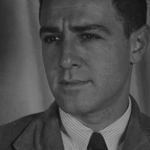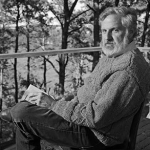The bugle sounds the measured call to prayers,
The band starts bravely with a clarion hymn,
From every side, singly, in groups, in pairs,
Each to his kind of service comes to worship Him.
Our faces washed, our hearts in the right place,
We kneel or stand or listen from our tents;
Half-naked natives with their kind of grace
Move down the road with balanced staffs like mendicants.
And over the hill the guns bang like a door
And planes repeat their mission in the heights.
The jungle outmaneuvers creeping war
And crawls within the circle of our sacred rites.
I long for our disheveled Sundays home,
Breakfast, the comics, news of latest crimes,
Talk without reference, and palindromes,
sleep and the Philharmonic and the ponderous Times.
I long for lounging in the afternoons
Of clean intelligent warmth, my brother’s mind,
Books and thin plates and flowers and shining spoons,
And your love’s presence, snowy, beautiful, and kind.



















Comment form: